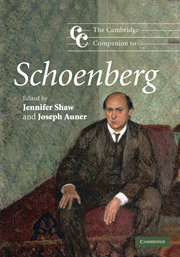1 - Introduction
Published online by Cambridge University Press: 28 September 2011
Summary
This Cambridge Companion provides an introduction to the central works, writings, and ideas of Arnold Schoenberg (1874–1951). Few would challenge the contention that Schoenberg is one of the most important figures in twentieth-century music, though whether his ultimate achievement or influence is for good or ill is still hotly debated. There are those champions who regard as essential his works, theories, and signature ideas such as “the emancipation of the dissonance,” and “composition with twelve tones related only to one another,” just as there are numerous critics who would cite precisely the same evidence to argue that Schoenberg is responsible for having led music astray.
No doubt many readers will take up this volume with some measure of trepidation; for concertgoers, students, and musicians, the name Schoenberg can still carry a certain negative charge. And while the music of other early modernist twentieth-century composers who have preceded Schoenberg into the ranks of the Cambridge Companions – including Debussy, Bartók, Stravinsky, and even Schoenberg's pupil Alban Berg – could be regarded as having achieved something of a state of artistic normalcy, Schoenberg's music for many remains beyond the pale. It is not our purpose here to bring Schoenberg in from the cold or to make him more accessible by showing that the alleged difficulty, obscurity, fractiousness, and even unlovability of his music are mistaken. On the contrary, much of his music – indeed almost all of his creative output, be it theoretical, literary, or in the visual arts – could be characterized to some degree as oppositional, critical, and unafraid of provoking discomfort.
- Type
- Chapter
- Information
- The Cambridge Companion to Schoenberg , pp. 1 - 12Publisher: Cambridge University PressPrint publication year: 2010
- 2
- Cited by



